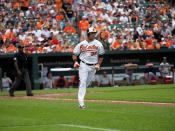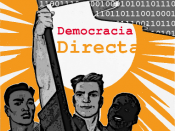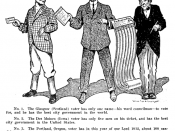Democracy is always named and used in the liberal discursive process. But if we refer to history, democracy of these days is not the same as democracy decades ago. Thus, it is important that democracy is understood as an evolution and not as a static concept. Similarly it is necessary to understand democracy by its principles and not by its practitioners in power.
Liberal democracy can be briefly defined as a system of government in which the people rule themselves, either directly or indirectly but in either case subject to constitutional restraints on the power of the majority (Dickerson and Flanagan 239).
If we analyze democracy by the principles extracted from the definition: equality of political rights, majority rule, political participation, and political freedom, we can ask ourselves if the present formal democracy represents its own principles.
Dickerson and Flanagan say that equality of political rights mean that every individual has the right to vote, run for office, serve on a jury, speak on public issues and carry out other public functions.
Furthermore, political rights are a matter of degree because they have been evolving during the last century. But it is not possible to know how much political equality is enough for democracy, because it seems to change every time and under different circumstances. An important example of how political rights can vary is the United States, because since 1787 until 1960 the franchise was extended to a majority of its citizens.
In Canada the franchise was first extended by the provinces and these would include the participation on federal elections. But due to the Act of 1885 the qualifications to vote in provincial and federal elections were uniform. After 1898 Canadian citizens would be able to vote for provincial and federal elections under the same franchise controlled by...


